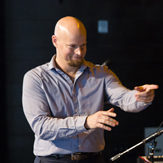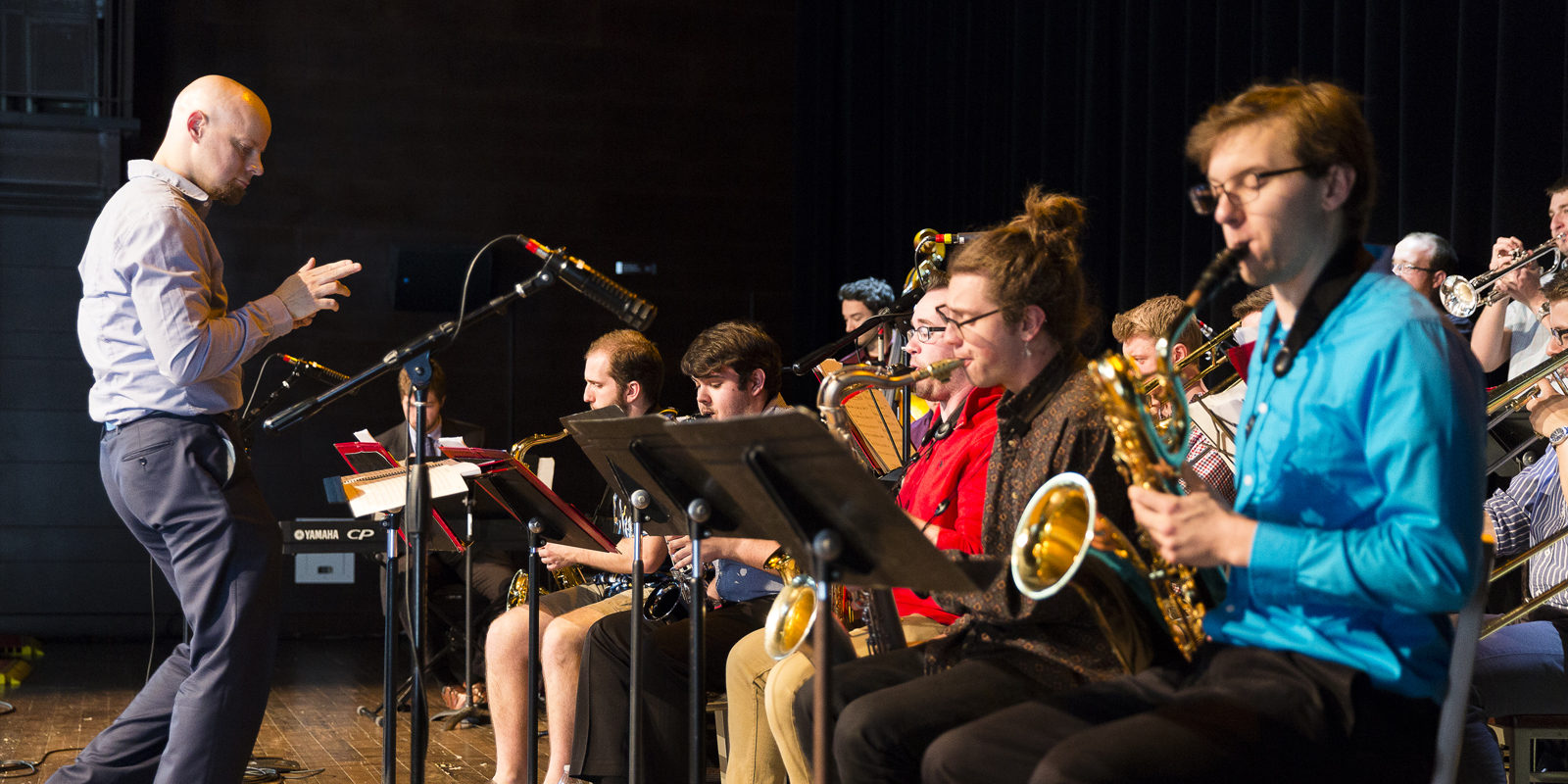While waiting for his piano lesson at a community college on Canada’s Vancouver Island, a 13-year-old Johannes Wallmann watched as an older student turned on a boom box to share a song with a friend.
“The music sounded unlike anything I’d ever heard,” he recalls.
Wallmann worked up the nerve to ask who the artist was, and the answer — Miles Davis — changed the course of his life. The next day, he asked his mother to drive him to a music store. He picked out a few CDs and soon returned for more. He began studying jazz, which has since led to him performing, recording, studying, teaching and, most recently, crafting and directing a jazz studies program at UW- Madison's Mead Witter School of Music.
When Wallmann arrived on campus in fall 2012, the School of Music had incredible talent in professors Richard Davis, who retired this past spring, and Les Thimmig, as well as several classes and ensembles devoted to the genre. But it lacked an official, comprehensive jazz program, something the school — and philanthropist John Peterson, who provided an endowment gift to name the John and Carolyn Peterson Fund in Jazz Performance — felt was essential.
Armed with experience building a jazz studies degree at California State University East Bay, and prior to that teaching at New York University and the New School for Jazz and Contemporary Music, Wallmann began by building upon what already existed here. He formed several new jazz ensembles, added courses and hired several new instructors.

The biggest thing I’m trying to do with it is create community.
The program now offers two undergraduate degrees in jazz studies, as well as graduate coursework in jazz improvisation, history and composition and arranging. “Our approach was to start small, build some things and do them well,” he says, “to build a jazz studies degree that incorporates best practices.”
School of Music Director Susan Cook says Wallmann has taken important steps that advance the school.
“Expanding our presence in the broad field of jazz performance is central to the mission of the School of Music,” she says. “Johannes has provided critical new energy to our jazz performance and jazz studies curricula. He’s an innovative pedagogue and an internationally acclaimed jazz pianist, ensemble leader and composer.”
But Wallmann is quick to point out that he didn’t make these changes alone. Building the program has required improvisation and collaboration, and he’s appreciative of the cooperation he’s found along the way.
“Any time you build a new program, you’re asking colleagues to make some sacrifices,” he says. “I think it says a ton about my colleagues’ support that they wanted to have a jazz studies program. I’ve really gotten tremendous support across the School of Music.”
An ability to forge connections has long been an important component to Wallmann’s work. The German-born musician says it’s an extension of the collaborative nature of playing jazz. Since moving to Madison, he has performed at venues across the city and strengthened ties between the university and the broader jazz community.
Tune In
Check out @UW-MadisonSOM on SoundCloud to hear the sounds coming out of the Mead Witter School of Music.
A project with special significance for Wallmann is the UW High School Honors Jazz Band, made up of top jazz students from Madison-area high schools who come together each year for master classes, rehearsals with the UW Jazz Orchestra and a grant-funded guest musician, and a concert.
The group is exactly what Wallmann loved as a student. While he performed with his middle and high school jazz bands in rural Canada, he also sought out summer band camps similar to UW's Summer Music Clinic to gain additional experience and meet young musicians as passionate about jazz as he was.
“The biggest thing I’m trying to do with it is create community,” he says of the band.
Wallmann has found his own jazz community in Madison, performing with small groups, a brass- focused ensemble and a 16-piece big band, and always honing his sound. “I call it modern acoustic jazz,” he says, explaining that his style is “very much grounded in the jazz of the 1960s,” of Davis in particular, but moves it into a more modern era.
This fall brings the release of Wallmann’s “Love Wins Project.” Featuring electronic and spoken- word elements woven into jazz, it’s a “musical exploration of marriage equality." Like the jazz studies program he’s building, the album is one more way Wallmann is using the power of music to unite and push forward.
“Jazz is almost always very collaborative,” he says. “We’re always having a musical conversation.”
Giving in Concert
A $25 million transformational gift from the Mead Witter Foundation, announced last fall, provides major funding for the School of Music’s new performance building, slated to begin construction at University Avenue and Lake Street late this year. The gift allows the facility to be built in a single phase.
It also complements Pamela and George Hamel’s earlier gift for the building, which will be named the Hamel Music Center and house a concert hall to be called the Mead Witter Foundation Concert Hall. The Collins Recital Hall will be named after longtime music supporters Paul and Carol Collins. The School of Music will be renamed The Mead Witter School of Music in honor of the foundation, a private philanthropic organization headquartered in Wisconsin Rapids.
“The ability to construct the entire music center at once is an incredible gift to our students,” says Susan Cook, director of the Mead Witter School of Music.
“These are spaces where our undergraduates will perform their capstone projects; where our graduate students will do their final doctorate recitals; where our largest student ensembles will perform; and where we will hold chamber recitals, lecture recitals and public events. It will be a magnet for faculty, students and the public for generations.”


